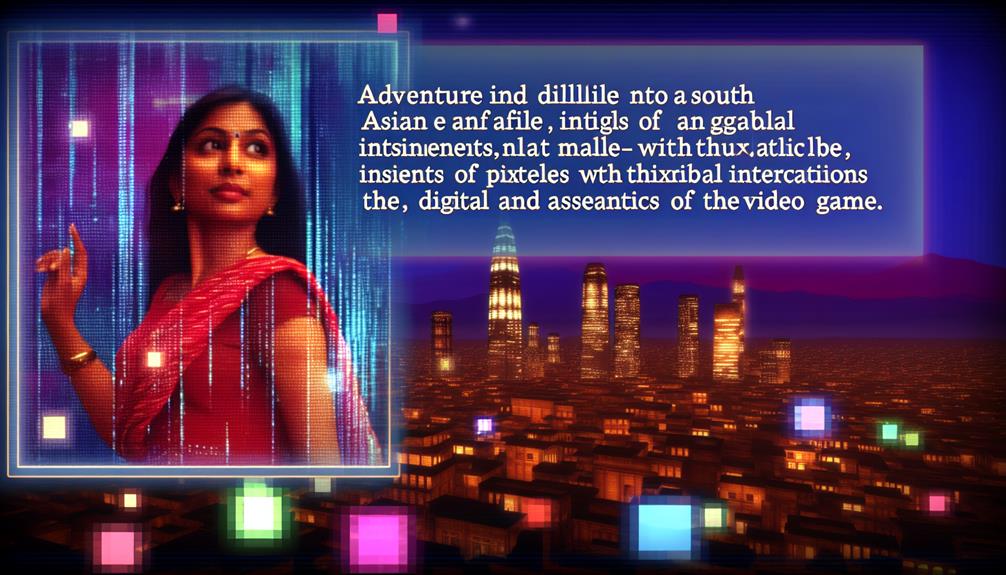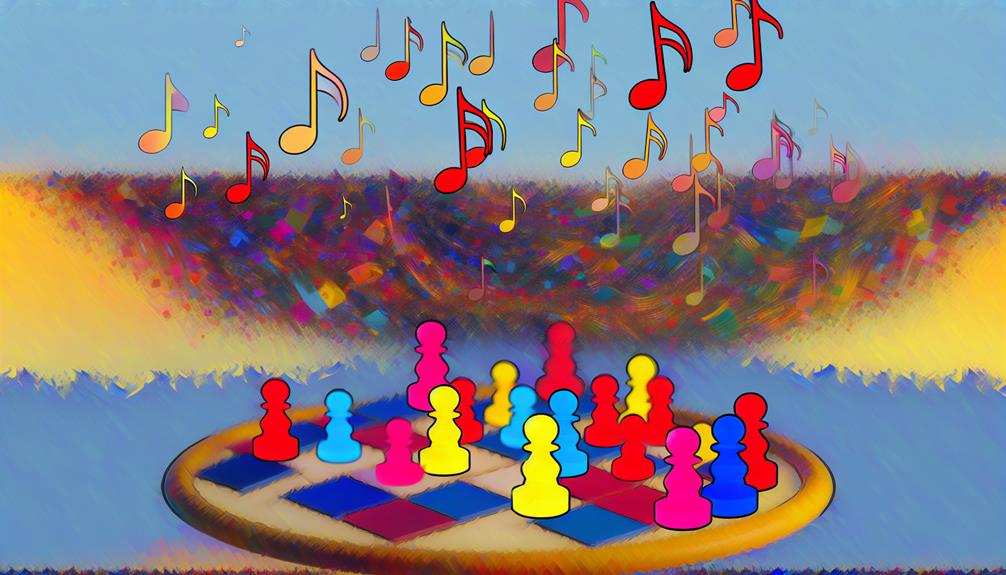Life mirrors a multifaceted video game, demanding continuous adaptation in an ever-evolving digital landscape. Each individual initiates quests for purpose, encountering challenges akin to boss battles that force resilience and strategic thinking. Social media serves as both a platform for connection and a battleground for authenticity, where digital personas often mask true selves. The journey is punctuated by milestones and achievements that resemble levels completed, fostering a sense of belonging and fulfillment. As players navigate this intricate game, they discover that growth requires not just external validation, but a recognition of intrinsic value. What unfolds next can reveal even deeper insights.
Key Takeaways
- Life mirrors video games through narrative journeys, where individuals seek purpose and personal growth amidst challenges and achievements.
- Digital personas serve as avatars, reflecting inner selves and shaping interactions in the hyper-connected virtual landscape.
- Resilience building, akin to leveling up in games, empowers individuals to adapt and recover from setbacks in real life.
- Mindfulness practices and productivity tools enhance focus and emotional balance, paralleling strategies used in gaming for optimal performance.
- Community engagement in online gaming fosters connections, providing a sense of belonging and support similar to real-life social interactions.
The Quest for Purpose
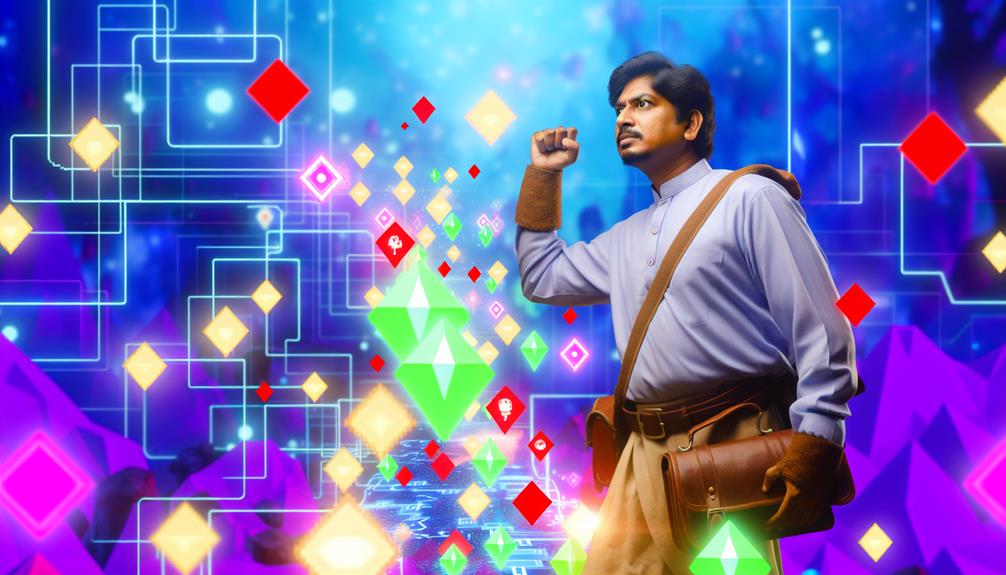
What drives individuals to seek purpose in their lives, and how does this quest parallel the objectives found in video games? The search for meaning often manifests as an existential quest, where individuals commence narrative journeys to fulfill life missions that resonate with their core values. In an age rife with digital distractions, the allure of virtual fulfillment becomes increasingly compelling. Video games offer immersive experiences that allow players to engage in quests that reflect their desires for achievement and recognition, mirroring the pressure felt in real life to succeed. Additionally, the rise of flexible work opportunities, such as remote customer service roles, provides individuals with the chance to pursue their passions while balancing life's demands.
As players navigate through levels, they confront challenges that echo their own struggles, creating a sense of belonging within a community of fellow seekers. This online escapism provides a temporary reprieve from the weight of achievement pressure, presenting a structured environment where fulfillment can be attained. However, it raises the question: Does this virtual quest dilute our real-life pursuits, or does it enhance our understanding of what we seek? Ultimately, the interplay between gaming and personal purpose remains a profound exploration of how we navigate our existence in an increasingly digitized world.
Leveling Up Personal Growth
As individuals commence on their journey of personal growth, they often seek to level up their skills and emotional resilience, much like players advancing through the stages of a video game. This process involves maneuvering through personal challenges that require not only skill acquisition but also a steadfast growth mindset. By embracing self-reflection, individuals can identify areas for improvement, setting tangible goals that serve as checkpoints in their development. Understanding the importance of real-time currency conversion can also enhance one's adaptability, as it reflects the need to stay updated and informed in a rapidly changing environment.
Resilience building becomes critical as one encounters setbacks; it is through these experiences that adaptability skills are cultivated. The journey is not linear; rather, it is marked by continuous learning and habit formation, where each setback can lead to newfound insights. Emotional intelligence plays a pivotal role in this leveling up, allowing individuals to better understand their emotions and those of others, fostering deeper connections and a sense of belonging.
Ultimately, personal growth mirrors the mechanics of a video game, where players refine their abilities and strategies over time. By actively engaging in this transformative process, individuals can emerge stronger and more capable, ready to face the next challenges that life presents.
Navigating Social Media Landscapes
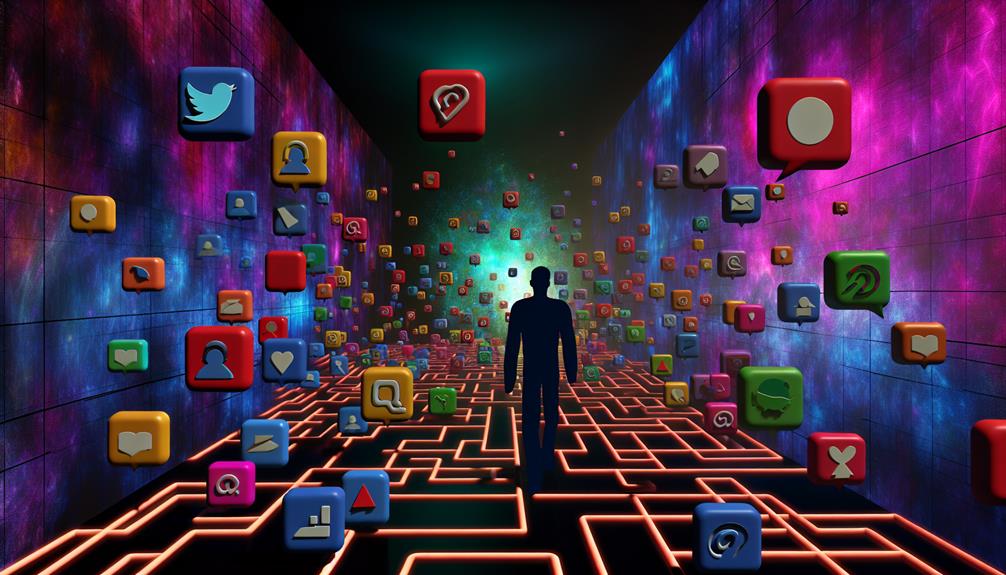
In the domain of social media, individuals construct digital personas that often serve as avatars in a complex game of self-presentation and social interaction. Recent trends, such as the media frenzy surrounding P Diddy's latest buzz, highlight how public figures navigate this landscape, influencing their followers and shaping perceptions. The pursuit of likes and shares becomes a form of validation, influencing behaviors and perceptions while raising critical questions about authenticity and self-worth. As privacy concerns intensify, the challenge lies in balancing the desire for connection with the need for personal security in an increasingly public arena.
Digital Personas and Avatars
How do the digital personas we curate on social media reflect our innermost selves while simultaneously shaping our interactions in a hyper-connected world? The concept of digital identity is not merely an avatar expression; it is a complex interplay of character customization that influences our online representation. Through our crafted personas, we navigate social roles and engage in virtual interactions that both reveal and obscure our true selves.
This duality raises poignant questions about persona authenticity and the pressures of maintaining a digital presence. Are we authentic in our identity exploration, or are we merely performing for an audience? In the vast expanse of gaming communities and social platforms, our avatars become extensions of our identities, reflecting desires for belonging and acceptance.
| Authentic Self | Curated Persona |
|---|---|
| Vulnerable and genuine | Polished and idealized |
| Reflects true interests | Influenced by trends |
| Builds real connections | Seeks validation |
Ultimately, our digital personas serve as both shields and mirrors, guiding our interactions and shaping our understanding of self in an increasingly interconnected landscape.
Likes, Shares, and Validation
The interplay between digital personas and social validation manifests most vividly through the mechanisms of likes, shares, and comments on social media platforms. These elements serve as a modern currency, shaping our online reputation and fueling the validation cycle that many navigate daily. In this landscape, engagement metrics become the benchmarks for success, often leading to an authenticity struggle as users curate their lives to fit within the confines of influencer culture.
The emotional landscape of social media can be dissected into four critical components:
- Likes vs. Love: The distinction between mere likes and deeper expressions of love highlights the superficiality of online interactions.
- Dopamine Feedback: Each notification serves as a dopamine trigger, reinforcing the cycle of seeking validation.
- Connection vs. Isolation: While social media promises connection, it often exacerbates feelings of isolation when genuine interactions are replaced with hollow engagements.
- Algorithm Effects: Algorithms dictate visibility, creating an environment where content aimed at eliciting likes often overshadows authenticity.
Ultimately, the quest for validation in a digital age underscores a profound tension: the desire for connection amidst the pervasive isolation that social media can foster.
Privacy in the Spotlight
Maneuvering the intricate landscape of social media necessitates a keen awareness of privacy, an often-overlooked cornerstone of digital engagement. The rise of surveillance capitalism has transformed our interactions into commodities, with our digital footprints meticulously tracked and analyzed. This reality demands that we critically assess privacy policies, which can often be convoluted and lack transparency, leaving users vulnerable to breaches in data security.
As we navigate this complex terrain, the concept of online anonymity becomes increasingly elusive. Trustworthiness metrics are frequently manipulated, making it challenging to discern safe spaces for sharing our thoughts and experiences. In this age of hyper-connectedness, consent management practices must evolve to empower users, ensuring they have control over their personal information.
Moreover, encrypted communication should be embraced as a fundamental tool in preserving our privacy, allowing for secure exchanges that protect our identities. Ultimately, fostering a culture that values privacy is essential for creating meaningful connections online. By prioritizing these facets, we can reclaim our agency and cultivate a digital environment where belonging is rooted in trust and authenticity, rather than exploitation.
Facing Life's Boss Battles
Maneuvering the myriad challenges of life often feels akin to confronting formidable boss battles in a video game, where each encounter tests our skills, resilience, and strategy. These battles demand a refined set of tactics and a mindset poised for growth. Embracing life's challenges requires a profound understanding of the boss strategies we can employ to cultivate our emotional endurance. Just as we seek to maximize our resources in a currency exchange strategy, we must also look for ways to optimize our responses to life's difficulties, ensuring we get the most value from each experience maximizing conversion value.
To successfully navigate these encounters, consider the following key components:
- Challenge Acceptance: Acknowledging the existence of challenges is the first step toward mastering them.
- Resilience Training: Engaging in practices that enhance our ability to bounce back from setbacks fosters a victory mindset.
- Tactical Planning: Developing a clear plan reduces the chaos associated with life's pressures, bolstering stress management.
- Perseverance Techniques: Implementing strategies that promote sustained effort helps combat a defeat mentality.
In this context, adaptive skills become essential. They empower us to pivot when necessary, reinforcing the importance of emotional endurance and strategic thinking. Ultimately, it is through these boss battles that we uncover our capacity for growth, connection, and belonging, transforming the trials of life into opportunities for triumph.
Power-Ups in Daily Life
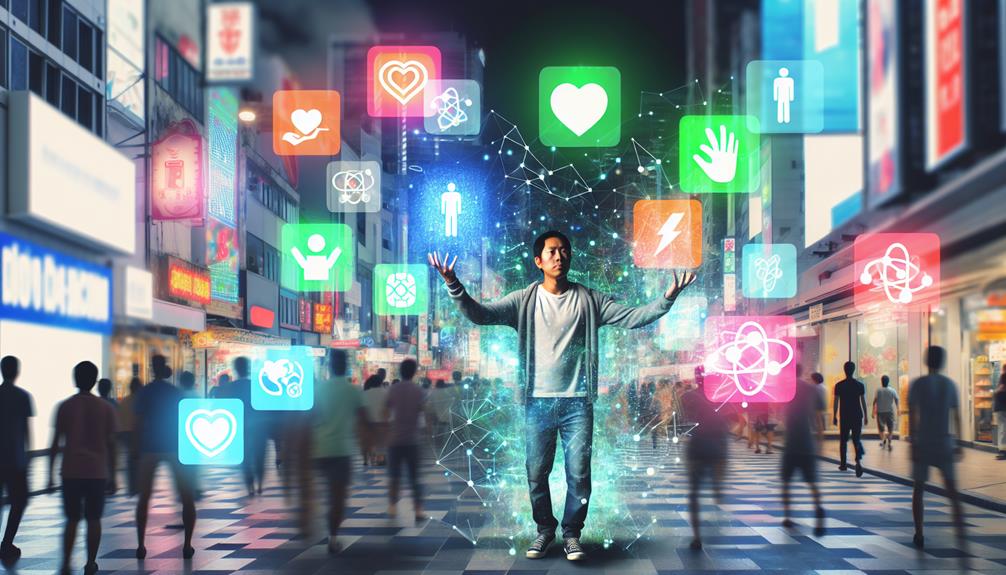
In the game of life, power-ups manifest as tools and practices that enhance our productivity, well-being, and learning. For instance, understanding financial strategies, such as how to maximize your currency exchange value, can greatly impact our resources and opportunities. By examining how these elements can serve as catalysts for personal growth, we can better understand their impact on our daily experiences. As we navigate through challenges, the strategic incorporation of these power-ups may redefine our approach to achieving success and fulfillment.
Boosting Productivity Tools
Productivity tools serve as essential power-ups in the game of daily life, transforming mundane tasks into streamlined processes that enhance efficiency and focus. In an era saturated with distractions, these tools are not merely conveniences; they are critical allies in the quest for productivity and personal fulfillment. By employing strategic methods, we can elevate our daily performances.
Consider the following powerful productivity hacks:
- Task Management: Utilize apps that prioritize and categorize tasks, allowing for clear goal setting and workflow optimization.
- Time Blocking: Allocate specific time slots for focused work, minimizing distractions and enhancing energy management.
- Automation Tools: Implement systems that automate repetitive tasks, freeing up time for more significant pursuits.
- Digital Detox: Regularly disengage from digital noise to foster mental clarity and facilitate distraction elimination.
Mindfulness and Well-being
Embracing mindfulness and well-being can greatly level up our daily experiences, allowing individuals to navigate the complexities of life with greater clarity and intention. In a world saturated with digital distractions, cultivating mindful moments is essential for emotional balance and stress management. Engaging in a digital detox can serve as a powerful self-care strategy, enabling individuals to reconnect with their inner selves and foster presence awareness.
Intentional living requires a commitment to prioritize not just activities but also our consumption habits. Mindful consumption encourages us to reflect on what we truly need, reducing anxiety and enhancing our overall well-being. Incorporating focus techniques into our routines can further enhance our ability to engage deeply with the present moment, cultivating a sense of fulfillment.
Additionally, establishing a gratitude practice allows us to appreciate the nuances of our daily lives, transforming ordinary moments into extraordinary experiences. By choosing to embrace these power-ups, we align ourselves with a community of individuals who value consciousness and connection. Ultimately, mindfulness and well-being empower us to navigate life's challenges with resilience, fostering a profound sense of belonging in an increasingly fragmented world.
Learning Opportunities as Power-Ups
Mindfulness and well-being lay a solid foundation for recognizing and seizing learning opportunities that can act as power-ups in our daily lives. In the context of a rapidly evolving digital landscape, these opportunities serve as essential tools for skill acquisition and knowledge enhancement, propelling us towards lifelong learning. To harness these power-ups effectively, consider the following avenues:
- Online Courses: Engage in structured learning experiences that foster digital literacy and critical thinking.
- Mentorship Opportunities: Seek guidance from experienced individuals who can provide insights and support, enriching your learning journey.
- Experiential Learning: Participate in real-world projects that promote adaptability training and creativity bursts, allowing for practical application of knowledge.
- Gamified Education: Embrace platforms that transform learning into an interactive experience, encouraging self-directed learning through rewarding engagement.
The Importance of Teamwork
In the sphere of video games, teamwork often emerges as a critical component that dictates success, echoing its significance in real-life scenarios. Much like a well-coordinated raid in an MMORPG, effective collaboration hinges on the seamless integration of diverse perspectives. Embracing collaborative strategies fosters an environment where communication skills thrive, enabling players to articulate their thoughts and intentions clearly.
Trust building is essential; without it, role dynamics falter, leading to misalignment and discord. When individuals unite under shared goals, the synergy effects become palpable—team motivation surges, and collective achievements materialize. The ability to navigate conflict resolution is equally paramount; it is through these challenges that the strength of a team is truly tested.
Reflecting on the space of video games, one can draw parallels to everyday interactions. In both contexts, the interplay of individual strengths and weaknesses ultimately shapes outcomes. By valuing each member's contributions and fostering an inclusive atmosphere, teams can transcend obstacles and reach new heights. As we explore deeper into our digital lives, recognizing the power of teamwork can transform our experiences into a cohesive journey towards success and fulfillment.
Game Over: Learning From Failure
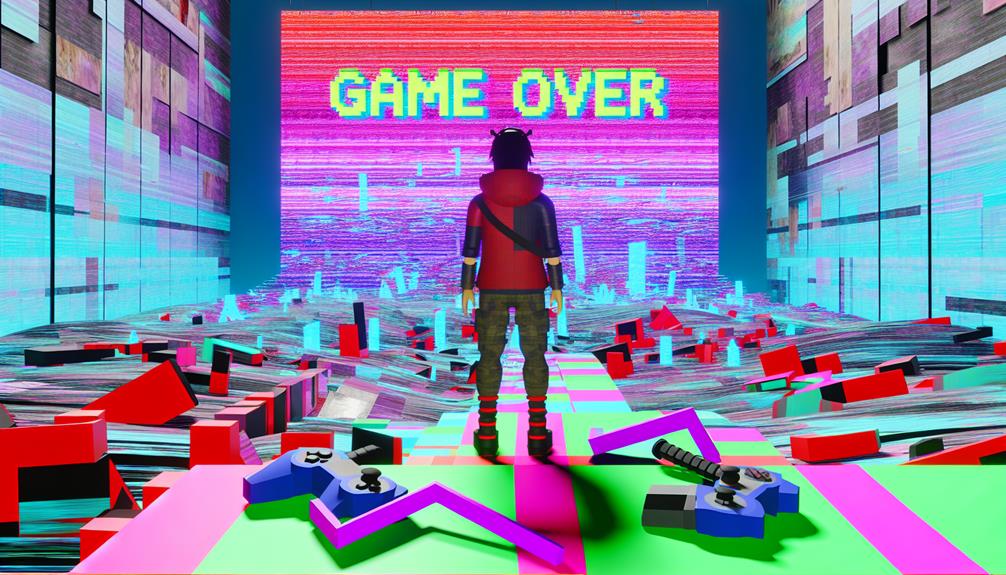
Frequently, players encounter the concept of "game over," a moment that, while often perceived as a setback, serves as an essential learning opportunity. Embracing failure is a vital component of personal growth and resilience building. It invites us to engage in failure analysis, reflecting on our experiences to extract valuable lessons that can redefine our understanding of success.
To effectively navigate these challenging moments, consider the following strategies:
- Emotional Recovery: Allow yourself to process emotions tied to failure, facilitating a healthier response.
- Constructive Criticism: Seek feedback and use it as a tool for improvement, shifting your perspective towards growth.
- Adaptive Skills: Cultivate the ability to adjust strategies and approaches when faced with obstacles, fostering a growth mindset.
- Personal Reflection: Engage in regular self-assessment, exploring what went wrong and how to adapt for future endeavors.
Ultimately, learning from failure is not merely about overcoming obstacles; it is about developing a deeper understanding of ourselves and our capabilities. By embracing these moments, we cultivate resilience and empower ourselves to redefine success on our own terms, forging a path toward continuous growth.
Achievements and Rewards in Reality
Achievements and rewards in reality often mirror the mechanics of a well-designed video game, where milestones serve not only as markers of progress but as catalysts for motivation. In our daily lives, real-life achievements manifest through personal milestones that enhance our sense of belonging and purpose. These accomplishments, whether they are related to career advancements or personal growth, yield tangible rewards that reinforce our intrinsic motivation.
The interplay between skill development and goal setting reveals the importance of intentionality in pursuing meaningful accomplishments. Each step taken toward a goal can be likened to leveling up in a game, where celebration moments—though often overlooked—serve as essential checkpoints that contribute to life satisfaction. External recognition from peers and communities further amplifies our sense of achievement, creating a shared experience that fosters connection.
However, the challenge lies in balancing the pursuit of these rewards with the understanding that fulfillment is often found within. As we navigate our own life quests, we must remain aware of the intrinsic value of our journeys, celebrating not just the end results but also the growth and resilience cultivated along the way.
Frequently Asked Questions
How Do Video Games Influence Real-Life Decision-Making Skills?
Video games greatly influence real-life decision-making skills by enhancing cognitive flexibility and promoting adaptive decision-making strategies. Players often face complex scenarios requiring quick, strategic choices that mirror real-world challenges. This immersive engagement fosters analytical thinking and encourages players to reflect on multiple perspectives before making decisions. As a result, individuals who engage with video games may develop improved problem-solving abilities and resilience, ultimately enriching their capacity to navigate both virtual and tangible environments effectively.
Can Video Games Improve Mental Health and Well-Being?
Video games have emerged as a significant tool for enhancing mental health and well-being through therapeutic gaming. These interactive experiences foster emotional resilience by allowing players to navigate challenges and develop coping strategies in a safe environment. As individuals engage with diverse narratives and characters, they are often able to express emotions and confront anxieties, ultimately creating a sense of belonging and community. This reflective process can lead to improved mental health outcomes and personal growth.
What Are Common Misconceptions About Gamers and Their Lifestyle?
Common misconceptions about gamers often stem from entrenched stereotypes that portray them as socially isolated or primarily sedentary individuals. However, these stereotypes are debunked by a growing understanding of gamer culture, which encompasses diverse communities and social interactions. Many gamers engage in collaborative play, fostering teamwork and communication skills. Additionally, gaming can promote mental agility and emotional resilience, challenging the notion that a gaming lifestyle is inherently detrimental to well-being or social engagement.
How Can One Balance Gaming and Real-Life Responsibilities?
Balancing gaming and real-life responsibilities necessitates effective responsibility management. Establishing a gaming schedule can help prioritize obligations while allowing for leisure. By allocating specific time slots for gaming, individuals can guarantee that personal, professional, and social commitments are met without sacrificing enjoyment. This structured approach fosters a sense of belonging within both gaming and real-world communities, ultimately enhancing overall well-being and productivity. Reflecting on one's priorities is essential for achieving this equilibrium.
Are There Educational Benefits to Playing Video Games?
The educational benefits of playing video games are increasingly recognized, particularly in areas such as cognitive development and skill enhancement. Engaging with complex narratives and problem-solving scenarios fosters critical thinking and adaptability. Additionally, multiplayer environments promote teamwork and communication skills, essential in today's interconnected society. As digital experiences continue to shape our interactions, it becomes imperative to explore how video games can serve as tools for learning and personal growth, inviting a sense of belonging within diverse communities.

